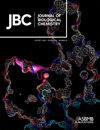SENP3 mediates the deSUMOylation and degradation of YAP1 to regulate the progression of triple-negative breast cancer.
IF 4
2区 生物学
Q2 BIOCHEMISTRY & MOLECULAR BIOLOGY
引用次数: 0
Abstract
Triple-negative breast cancer (TNBC) is a prevalent malignancy in women, casting a formidable shadow on their well-being. Positioned within the nucleolus, SUMO-specific protease 3 (SENP3) assumes a pivotal role in the realms of development and tumorigenesis. However, the participation of SENP3 in TNBC remains a mystery. Here, we elucidate that SENP3 exerts inhibitory effects on migration and invasion capacities, as well as on the stem cell-like phenotype, within TNBC cells. Further experiments showed that YAP1 is the downstream target of SENP3, and SENP3 regulates tumorigenesis in a YAP1-dependent manner. YAP1 is found to be SUMOylated and SENP3 deconjugates SUMOylated YAP1 and promotes degradation mediated by the ubiquitin-proteasome system. More importantly, YAP1 with a mutation at the SUMOylation site impedes the capacity of wild-type YAP1 in TNBC tumorigenesis. Taken together, our findings firmly establish the pivotal role of SENP3 in the modulation of YAP1 deSUMOylation, unveiling novel mechanistic insight into the important role of SENP3 in the regulation of TNBC tumorigenesis in a YAP1-dependent manner.SENP3 介导 YAP1 的去 SUMOylation 和降解,以调控三阴性乳腺癌的进展。
三阴性乳腺癌(TNBC)是女性的一种常见恶性肿瘤,给她们的健康蒙上了一层可怕的阴影。SUMO特异性蛋白酶3(SENP3)位于细胞核内,在发育和肿瘤发生过程中发挥着关键作用。然而,SENP3 在 TNBC 中的参与仍然是一个谜。在这里,我们阐明了SENP3对TNBC细胞的迁移和侵袭能力以及干细胞样表型具有抑制作用。进一步的实验表明,YAP1是SENP3的下游靶标,SENP3以依赖YAP1的方式调控肿瘤发生。研究发现,YAP1被SUMO化,而SENP3能使SUMO化的YAP1脱钩,并促进泛素蛋白酶体系统介导的降解。更重要的是,SUMO化位点发生突变的YAP1阻碍了野生型YAP1在TNBC肿瘤发生中的能力。综上所述,我们的研究结果牢固确立了 SENP3 在调节 YAP1 去 SUMOOylation 中的关键作用,揭示了 SENP3 以 YAP1 依赖性方式在 TNBC 肿瘤发生调控中的重要作用的新机理。
本文章由计算机程序翻译,如有差异,请以英文原文为准。
求助全文
约1分钟内获得全文
求助全文
来源期刊

Journal of Biological Chemistry
Biochemistry, Genetics and Molecular Biology-Biochemistry
自引率
4.20%
发文量
1233
期刊介绍:
The Journal of Biological Chemistry welcomes high-quality science that seeks to elucidate the molecular and cellular basis of biological processes. Papers published in JBC can therefore fall under the umbrellas of not only biological chemistry, chemical biology, or biochemistry, but also allied disciplines such as biophysics, systems biology, RNA biology, immunology, microbiology, neurobiology, epigenetics, computational biology, ’omics, and many more. The outcome of our focus on papers that contribute novel and important mechanistic insights, rather than on a particular topic area, is that JBC is truly a melting pot for scientists across disciplines. In addition, JBC welcomes papers that describe methods that will help scientists push their biochemical inquiries forward and resources that will be of use to the research community.
 求助内容:
求助内容: 应助结果提醒方式:
应助结果提醒方式:


